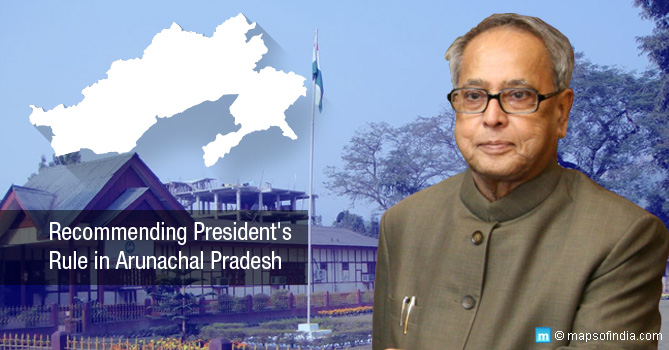There is a political storm brewing in the otherwise quiet state of Arunachal Pradesh. On Sunday, 24 January 2016, the Union government, on advice of Governor JP Rajkhowa, recommended President’s rule in Arunachal Pradesh, thereby triggering a major political war between the ruling INC and BJP.
The Congress high command on 25 January 2016, which included noted lawyer Kapil Sibal, Mallikarjun Kharge and Ghulam Nabi Azad, rushed to meet with President Mukherjee to protest the Arunachal Pradesh Governor’s decision to recommend President’s rule and the Union Government’s decision to impose President’s rule in the state. Their contention was that since the Supreme Court is already apprised of the matter, it was unconstitutional of the Governor to recommend President’s rule at this juncture.
The Congress contention has been that the state assembly floor is the place to test the ruling government’s strength and the Governor cannot act unilaterally without seeking advice from the head of the ruling government.
On the same day, Home Minister Rajnath Singh met the President to put forth the government’s point of view on the situation and justify the central government’s decision to go by the Governor’s recommendation. President Mukherjee, however, was unlikely to take an immediate decision, especially before Republic Day, and has sought legal advice before responding.
Congress approaches the apex court
Meanwhile, on Monday, Congress petitioned the Supreme Court on the matter and the same will come up for hearing before a five member bench on 27 January 2016. The Supreme Court will adjudicate on the role and powers of the Speaker and the Governor, as also on the constitutional validity of decisions taken that has led to the current crisis.
Genesis of the present crisis
Arunachal Pradesh has been on the boil with a section of MLAs disgruntled with the Speaker Nabam Rebia, who also happens to be the cousin of the present Chief Minister Nabam Tuki.
Congress is the ruling party in Arunachal Pradesh holding 47 assembly seats out of a total of 60. In December 2015, 21 out of 47 Congress MLAs rebelled against the party.
On 14 December 2015, 14 Congress MLAs were suspended by the Speaker. In retaliation, on 16 December 2015, the same 14 Congress MLAs quit the party and joined 11 BJP rebels and two other independent MLAs, and held a ‘special’ assembly session outside the state assembly, in a community hall in Itanagar and voted out the Speaker, Nabam Rebia. The Deputy Speaker, who supported the move, dismissed the Speaker leading to a political crisis.
Given the emerging situation, the Governor then advanced the assembly session that was due to meet on 14 January 2016 to December 16 2015, wherein the Deputy Speaker dismissed the Speaker and revoked the disqualification of the 14 MLAs. The ruling party has opposed the Governor’s decision to unilaterally advance the assembly session date without the consent and advice of the Council of Ministers.
The state government then approached the Guwahati High Court, where one judge had overturned the dismissal of the Speaker, but another judge has since stayed the decision and referred the matter to the Supreme Court.
And now that the matter is under the apex court’s consideration, the decision by the Governor to impose President’s rule is being vehemently opposed by the Congress party, at the state and central level. Rahul Gandhi took an aggressive stand against the move calling it a ‘murder of democracy’.
Bad timing?
The move to impose President’s rule just before Republic Day, is a bit surprising, since the Union government would like to present a united country before the world, especially since the French President is the Guest of Honour at this year’s Republic Day celebrations and therefore, international attention would naturally be on India.
So what pushed the BJP high command to make this move? After suffering crucial electoral losses in Delhi and Bihar, and with a tough chance in Bengal and a tentative situation in Punjab, BJP high command has been keen to show some electoral gains.
Since the local unit in Arunachal Pradesh has been successful in weaning away 14 of Congress MLAs, the party high command wants to run home the advantage in the hope that it would be in a better position, both in the state and at the national level, once President’s rule is lifted in Arunachal Pradesh. This still doesn’t explain the urgency just before an important national event like the Republic Day.
The Governor’s role in the entire saga will also be closely examined by the Supreme Court before any decision is taken on the validity of imposition of President’s rule. Arunachal Pradesh has been relatively stable and free of militancy, unlike many other states of the North East, and one hopes that the centre doesn’t repeat the mistake it made in J&K during the 1987 elections which led to a spurt in armed insurgency.






